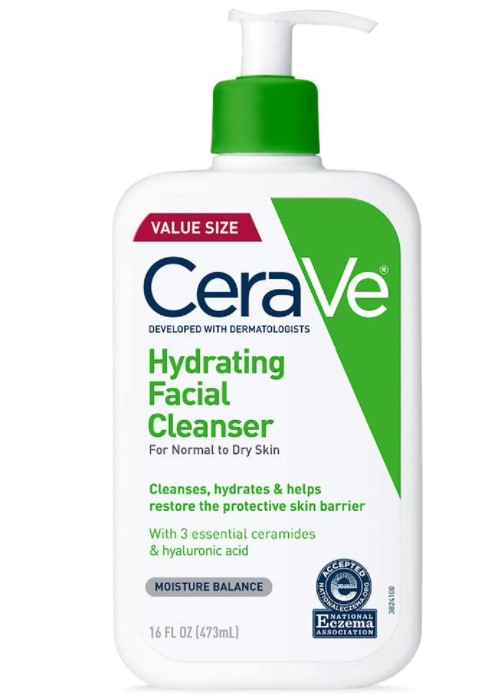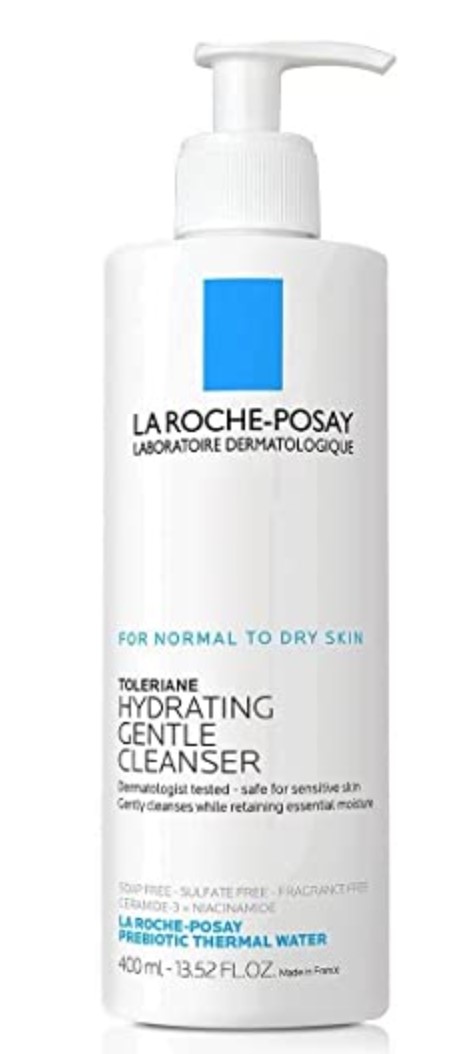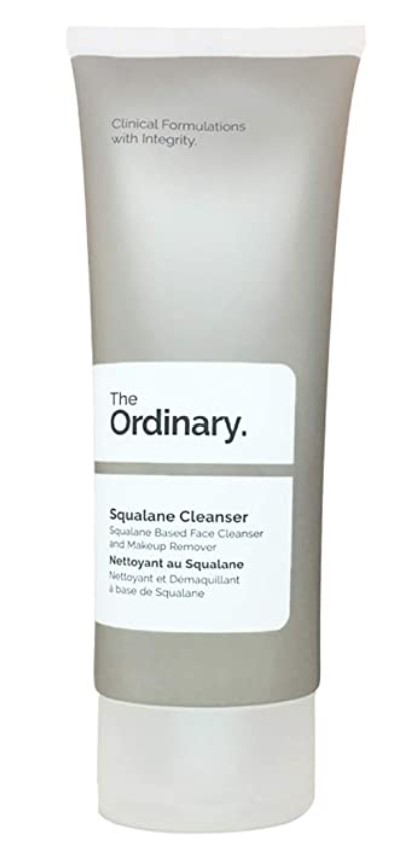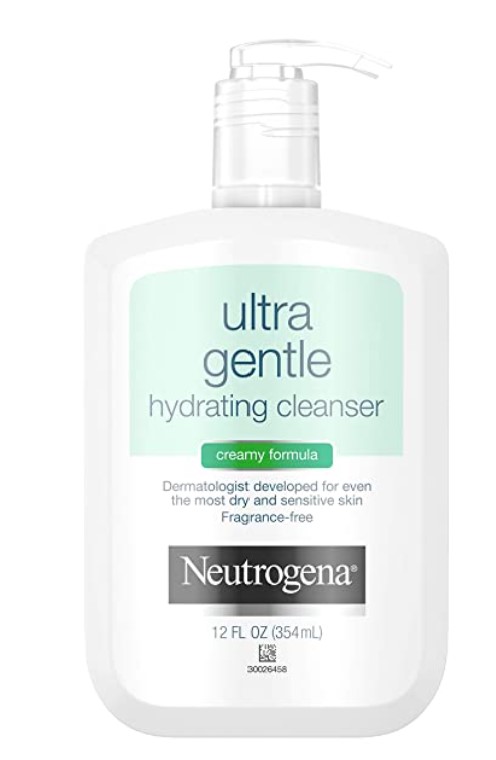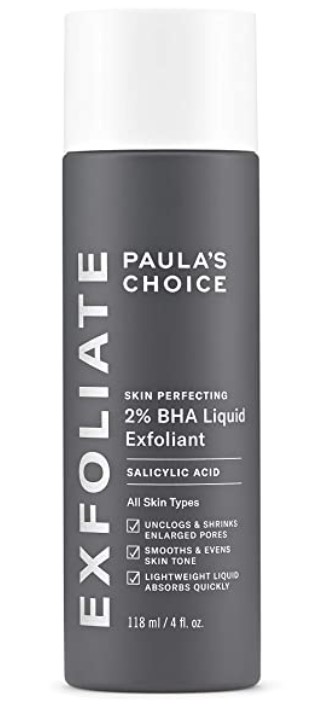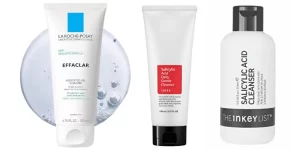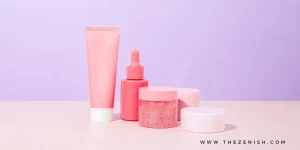
Most people will experience acne and breakouts at some point in their life.
If you’re going through a rough patch where your face is breaking out, it can impact your self-confidence.
And you may be wondering why is my face breaking out.
While some breakouts can be caused by allergies or hormones, more often than not, breakouts are triggered by external factors such as stress, diet and pore-clogging skincare products etc.

If these triggers are affecting your skin, it’s best to make a change so your skin can heal.
Sometimes all it takes is being aware of your triggers and making changes.
Making changes to your lifestyle or creating a new routine for yourself to start making headway in stopping your breakouts or making them less frequent.
Why is my face breaking out: 15 most common reasons
| this post may contain affiliate links, which means if you purchase from one of these links, I may receive a small commission at no additional cost to you. |
1. smoking is causing your breakouts
Smoking is not only bad for your health, but it’s also bad for your skin.
Smoking not only makes you more at risk of cancer, but it deprives your skin of oxygen and impairs the production of collagen and elastin and prematurely ages your skin.
The toxins in cigarettes also irritate your skin and dry it out, triggering the production of more oil and, possibly, more breakouts.
quick fix: do your best to quit smoking. It’ll do your health and skin a world of good.
2. your face mask is causing your acne
You might think that a face mask can’t cause acne, but many people have complained about their skin getting worse after using a face mask, especially on their chin, jawline and cheeks.
This phenomenon is called “mask acne” and its been rising throughout the pandemic.
If your face mask is causing your acne, there are a few things that could be happening.
One possibility is that the mask is creating the perfect environment for all the sweat, oil and bacteria to collect in your pores and cause a breakout.
A mask also traps sweat and humidity and increases the risk of acne. Another possible factor is friction.
The material can rub against your skin and cause chafing and irritation.
Another reason may be that you are sensitive or allergic to the material.
Some masks are pretreated with chemicals or feel rough on the skin, whereas others irritate your skin after being washed with certain detergents.
quick fix:
- choose a face mask made with a breathable fabric
- stock up on a few so you always have a clean one
- wash your reuseable masks after each use
- choose a light coverage or skip makeup altogether when you can
product picks:
3. stress is causing your breakouts
One cause of acne vulgaris boils down to stress.
Stress causes increased production of hormones which stimulate oil production in the sebaceous glands (that produce sebum, an oily substance) within the hair follicles of your skin.
The increased oil production can lead to clogged pores and breakouts and even blind pimples.
quick fix:
- get regular exercise
- take time to relax and recharge
- try meditation
4. your face scrub is making your acne worse
Your face scrub is making your breakouts worse and there’s a very simple explanation: the ingredients in your face scrub are irritating your skin, which is causing your immune system to generate more oil and cause acne.
Exfoliating regularly does your skin a world of good but not if it causes trauma and damages your skin’s protective barrier.
Instead of exfoliating with a harsh scrub, make use of less abrasive yet still effective formulas that contain chemical exfoliators, like lactic acid and glycolic acid. These formulas don’t require the use of vigorous scrubbing.
product picks:
5. picking your face is causing your breakouts
It’s never a good idea to pick at your face or pimple. Picking your pimple can lead to even more infection and scars. Even worse, you run the risk of pushing the bacteria deeper into your skin and making the problem worse.
To reduce temptation, cover the pimple with a pimple patch. Which will protect the blemish, keep you from picking, and allow it to heal faster.
6. your hair products are causing your breakouts
Hair products are an important part of one’s beauty regime. But if you are not careful, they can be harming your skin. The same ingredients found in skincare products that can clog pores and irritation can also be in your shampoo and conditioner.
And just as they can cause breakouts on your face, these ingredients can seep into your pores and clog them too – you might notice chest acne, back acne and even pimples on the sides of your hairline or your scalp.
Switching to a sulphate-free shampoo and keeping your hair off of your face can help manage unwanted breakouts.
7. using too many harsh acne treatments is causing your breakouts
Most people do not know that acne treatments can be too harsh on your skin. Benzoyl peroxide and salicylic acid are meant to treat breakouts, but they can also cause some damage.
Topical treatments containing salicylic acid, benzoyl peroxide, or sulphur can dry out the skin and cause more oil to be produced. This will lead to an increase in acne. The active ingredients in many acne treatments can also burn the top layer of your skin, causing it to turn red and raw.
You don’t have to stop using your usual spot treatments, but make sure you use them sparingly. Two to three times a week or every other night should work. And if you have any reactions afterwards, try switching to an over-the-counter 1% hydrocortisone cream to calm the inflammation and take down the redness.
8. your skincare products are causing your breakouts
The ingredients in your products are causing acne. Ingredients like alcohols and surfactants strip away oils and other natural skin protectors that keep skin hydrated and healthy. Mineral oil can be a powerful moisturizing agent but it may clog your pores if you have been prone to blackheads and whiteheads.
Coconut oil often clogs pores. Another ingredient to be aware of is fragrance, as it can irritate sensitive skin. Sodium lauryl sulphate, an oil-stripping surfactant, is also found in many products and is a common acne cause.
These ingredients make the skin less resistant to harmful environmental factors like UV rays and pollution.
Knowing what to look for on a label isn’t always easy, but the process is made a lot easier by simply switching to products containing fewer of the common irritants and opting for fragrance-free skincare & sulphate-free products. And when in doubt, look for products marked non-comedogenic.
9. your workouts are causing your acne
Other factors that contribute to acne include excessive sweating. Your sweat contains bacteria and other substances that can cause breakouts and other skin problems.
Exercise is great for you: it helps with weight loss, reduces stress, and strengthens your heart.
However, these benefits come at the cost of more sweat on your face and body which can worsen acne.
Skipping a shower right after working out or not washing your face after can lead to breakouts and clogged pores, as the mix of dirt, bacteria, oil and sweat finds a nice place to stay in your pores.
To maintain the healthiness of your skin while getting in a good workout, always remove your makeup and wash your face before you start sweating.
Then, after you’re finished with your workout, shower. If you don’t have time to take one right away, use facial wipes to cleanse.
10. your diet is causing your breakouts
Many factors play a role in acne breakouts. From not removing makeup before bed to stress and diet.
High-fat food, processed food, dairy products, sugar and refined carbs have been known to cause acne breakouts.
These type of foods often leads to a quick spike in blood sugar levels.
When blood sugar levels spike, the body produces more insulin. Increased insulin increases the production of sebum.
All that oil can overwhelm the pores, leading to acne.
Your doctor can provide valuable advice if you experience some problems with your health.
Talk to your dermatologist or visit a gastroenterologist and list the foods you’ve been eating lately to see whether they are causing any issues.
If not, add some healthy foods to your diet.
Talk to your doctor to find out if what you’re eating could be the cause of your symptoms or something more serious.
And consider adding some healthy foods to your diet for clearer skin.
11. you’re not washing your face and pillow cases enough
During the day, dirt, oil, makeup and grime build up on your skin.
If you don’t wash your face before falling asleep, all of that gets transferred to your pillowcase which gets transferred back to your face again.
A build-up of bacteria, plus the friction of your face rubbing against the pillowcase, can cause inflammation and breakouts.
Wash your pillowcases at least once a week to get rid of any pesky dirt and sweat.
12. your laundry detergent is causing your breakouts
Did you know that laundry detergents can be irritating to your skin and cause breakouts?
Some of the chemicals found in laundry detergents can be too harsh for your skin.
Once you put clothes on or use a towel, your complexion might react to whatever residue is left on it, causing breakouts on your face.
If you recently switched to a new detergent and noticed breakouts, it might be the culprit.
Consider choosing a detergent that is dermatologist-tested, fragrance and dye-free.
13. sunbathing could be causing your breakouts
The positive effects of sunlight are clear. Sunlight helps your body produce vitamin D, which is vital for healthy bones and teeth.
However, too much sun without the proper protection can harm your skin.
Sometimes touted as a miracle worker for skin, the sun worsens acne.
It dries out your skin and causes excess production of oil to form in pores, which leads to pimple formation.
Sunlight helps release hormones that increase the amount of sebum your body produces.
Too much of this oil may lead to clogged pores, which can result in a host of other problems for the skin.
If you want to spend time outdoors, make sure to wear sunscreen with titanium dioxide or zinc and wear a hat to protect your face.
14. a lack of sleep is causing your breakouts
While we sleep, our bodies can rest and heal. Energy levels are restored, cells regenerate, and blood supply increases to the muscles and bones.
Bones grow and tissues repair. Sleep also boosts your immune system which helps you fight off infections.
Lack of sleep can lead to stress which increases the production of oils in the skin.
Sleep is also the time when cortisol levels decrease. Not getting enough sleep can lead to a rise in cortisol, which leads to a rise in acne.
Sleep is important. Try to disconnect from work and activities that make it difficult to fall asleep.
Start winding down about an hour beforehand and aim for getting 8 hours of sleep.
15. it’s not really acne
Sometimes the acne you’re trying to treat isn’t acne, which would explain why what you’ve tried so far hasn’t worked or is even making them worse.
If your breakouts are popping up in areas like the back of your neck, forehead, chest or along your hairline and they’re small itchy, red bumps of roughly the same size, you might have fungal acne.
This is caused by Malassezia folliculitis.
Although this might look like acne at first, it’s an infection of the hair follicles. The treatment for this type of infection is usually different than the one you use for acne.
Your dermatologist can help determine if you have fungal acne and prescribe a treatment.
If it’s a mild infection, the use of an anti-dandruff shampoo with zinc pyrithione or selenium sulphide could be enough to clear it up.
Apply the formula to the affected area of the skin, wait 10 minutes, then rinse it off.
Fungal acne can thrive on sweat, friction, and excess sebum; so make sure to actively wash sweaty clothes and shower after excessive sweating.
How do I stop my face from breaking out?
Breakouts are mainly caused by hormones and the overproduction of oil. Essentially, hormones increase your oil production, which clogs your hair follicle and leads to the growth of the P. acnes bacteria.
Some people may experience breakouts more or less frequently than others due to their genetic makeup or lifestyle choices.
This is why no single ingredient or routine will work across the board. So a good place to start would be with a consultation with a dermatologist.
A dermatologist will be able to help you understand what factors may be contributing to your acne by completing a comprehensive history and examining the photos of your skin.
They’ll also work with you to choose products that are appropriate for your skin type or give you advice on skincare routines.
Or sign up for an online skincare audit to ensure you’re getting the best skincare products for your skin type and concerns.
In the meantime, You may want to start paying attention to your daily habits and routine in case one of the above triggers could be triggering or exacerbating your breakouts.
How do you get rid of sudden acne breakouts?
If you experience sudden breakouts, here are 7 things you can do to calm your skin:
- wash your face with a gentle cleanser: harsh cleansers can dry out your skin and make your acne worse
- eat more whole foods: try to eat more whole grains, vegetables, fruits, and legumes, and incorporate other foods such as lean meat and seafood, avocados, oils, nuts, seeds, herbs and spices
- drink water: dehydration can lead to your body overproducing oil which then causes breakouts
- avoid touching your face: our hands come in contact with a lot of bacteria throughout the day and can transfer acne-causing bacteria to your face. so avoid touching your face unless you really have to and wash your hands before
- try to manage stress: stress can lead to inflammation and cause your body to produce more oil, both of which can lead to breakouts and make breakouts worse.
- get plenty of sleep: inadequate sleep can lead to stress which leads to inflammation, oil over-production and breakouts
- try OTC medication: products with ingredients like benzoyl peroxide and salicylic acid can spot-treat pimples and help manage breakouts

